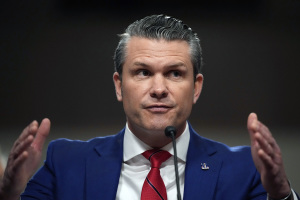'Gender Queer' tops list of most challenged library books: American Library Association

LGBT-themed books, some of which promote pedophilia and sexual experimentation to young readers, were among the literature most challenged by complaints demanding that they be banned, according to the American Library Association.
In a report released Monday listing the 10 most-challenged library books of 2023, the ALA found that most of the entries were challenged on the basis of them including lewd content, including graphic depictions of sex acts and sexual promiscuity that raised numerous concerns among parents.
No. 1 on the list of most challenged books was Gender Queer by Maia Kobabe, a 2019 graphic memoir that has garnered backlash for its sexually explicit content, including teen boys having oral sex, the use of a sex toy, and a gender-confused girl wearing a breast binder, among other depictions that are too graphic to mention in this article.
Coming in at No. 2 was All Boys Aren’t Blue by George M. Johnson, and in third place was This Book is Gay by Juno Dawson, both of which received complaints over containing sexually explicit and LGBT content.
The remaining entries, from fourth to tenth place, included The Perks of Being a Wallflower by Stephen Chbosky, over concerns of being sexually explicit and LGBT content, including rape, drugs and profanity; Flamer by Mike Curato, over concerns about LGBT and sexually explicit content; The Bluest Eye by Toni Morrison, over concerns about rape, incest, sexually explicit content and diversity content; a seventh-place tie between Tricks by Ellen Hopkins and Me and Earl and the Dying Girl by Jesse Andrews; Let's Talk About It by Erika Moen and Matthew Nolan over LGBT and sexually explicit content; and Sold by Patricia McCormick, over concerns about sexually explicit content and rape.
ALA President Emily Drabinski contended in the report that it's “obvious that the pressure groups are targeting books about LGBTQIA+ people and people of color.”
“At ALA, we are fighting for the freedom to choose what you want to read. Shining a light on the harmful workings of these pressure groups is one of the actions we must take to protect our right to read,” Drabinski stated.
In recent years, the ALA has garnered controversy for its opposition to banning books that contain explicit material, with many arguing that the institution is effectively defending pornographic books.
Last year, state libraries in Montana, Missouri and Texas severed ties with the ALA, with state lawmakers in several other states championing similar measures, The Washington Post reported.
Alabama state Rep. Susan DuBose argued for a similar law in her state, writing in an opinion piece last year that the ALA “has long been a conduit to allow libraries across the country to bring in pornographic and age-inappropriate books, fight against internet filters that block porn access, and resist concerns from residents who want libraries to represent local community standards and protect children.”
“Alabamians do not need their local library policies to be influenced by a national organization led by a Marxist,” wrote DuBose. “Our local libraries should not select books based upon recommendations by an association that does not share our community values.”





























